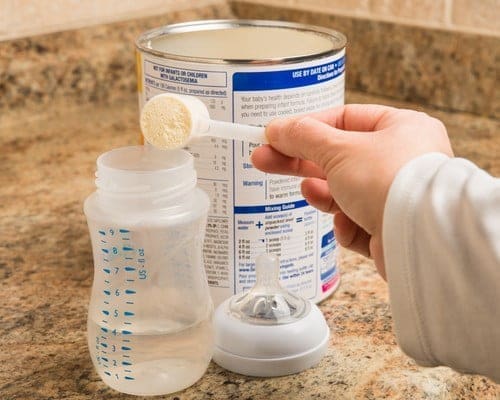
Preparing baby formula isn't hard, but it's important to mix it in the proper ratio of formula to water to make sure that your baby is getting just the right amount of nutrients. Also, because your baby doesn't have much immunity to germs just yet, especially as a newborn, it's important to take precautions to protect him from food borne illnesses. Here's what you need to know.
Keeping Formula Fresh
Check the expiration date before you buy. It may be tempting to grab a can and run when you're shopping with a fussy baby, but taking a few seconds to check the use-by date helps assure safety and quality. Do the same at home (aff) if you buy in bulk. Even when you’re purchasing online, opt for trusted brands like The Honest Company.
If you have a newborn, you might want to wait a couple of months to establish a feeding routine before stocking up. That way, you can figure out how much formula you'll be able to use before it expires.
Also make sure that the can isn't dented. When a can is dented, the tin layer inside might be cracked. This allows the liquid to come in contact with the steel, potentially causing rust and even a hole that could cause the contents to spoil.
If you accidentally purchase formula already past its use-by date, return it to the store and request a fresh container. Most formula makers allow retailers to return unopened containers of expired formula for free replacement. Keep formula cool but not frozen (aff). Heat and cold can degrade the ingredients and the nutrients in formula, so keep unopened liquid and powdered formula in a cool place.
Choose a cabinet or a shelf that's away from a stove, oven, heating ducts or hot water pipes. The optimum storage temperature is between 55 and 75 degrees Fahrenheit, but make certain that it stays below 95 degrees and above freezing, or 32 degrees. Don't leave cans in direct sunlight and don't put them in the freezer.
Once you open a can of liquid formula, follow the directions on the can for storage. Most suggest storing it in the can, covered, for 24 to 48 hours. It’s best not to put powdered formula in the refrigerator or another damp place because humidity can cause the powder to clump, which may make the formula over-concentrated. Once you've opened a can of powdered formula, use it within a month.
Be Smart
Emphasize cleanliness. Before preparation, wash your hands thoroughly. Wash the counter or table where you will be mixing up the formula, as well as the lid and outside of the can (dirt or bacteria on the lid can fall into the can when you open it). When you open the container, check for foreign particles and discoloration; in liquids, check for curdling.
Mix and measure carefully. For powdered formula you should boil the measured water, pour it into a clean bottle, and add the measured amount of formula. Don’t let the water cool below 70 C to ensure any dangerous bacteria are killed. The measuring scoop should be leveled off with the flat size of a knife before a scoop is poured into the bottle.
For liquid-concentrate formulas, measure the water that is added with a measuring cup — lines on the bottle may not be accurate. Let the tap run for two minutes, to reduce the amount of lead and other contaminants. (If you have well water, boil the water.) Or use distilled bottled water.
Hold your baby for feedings, with your baby in a semi-sitting position where he can see your face and you can watch for signs that he needs a break. If the milk flows too quickly, you may need a different nipple — the baby should have to actively suck to get milk.
Final Tips
When it comes to making sure your formula keeps, follow these tips:
- Store formula in the back of the refrigerator, where it is coldest. Discard formula after 24 hours in the fridge. Never freeze formula. Use a cooler with ice packs to transport bottles.
- Don’t use formula that has been at room temperature for more than two hours. Also discard leftovers if your baby doesn’t finish a bottle.
- Don’t try to get the baby to finish the bottle if she shows signs of wanting to stop, as this leads to excess weight gain.
These are important tips to keep in mind, but above all else make sure that the formula you buy is right for your child before you whip up a bottle. Because powdered formula is not sterile, babies under two months of age, those who were born prematurely and not yet two months past their expected due date and babies who have a compromised immune system should only be given concentrated liquid or ready-to-serve formula.

